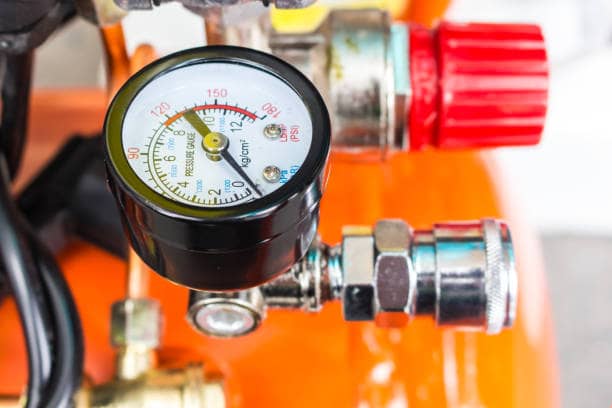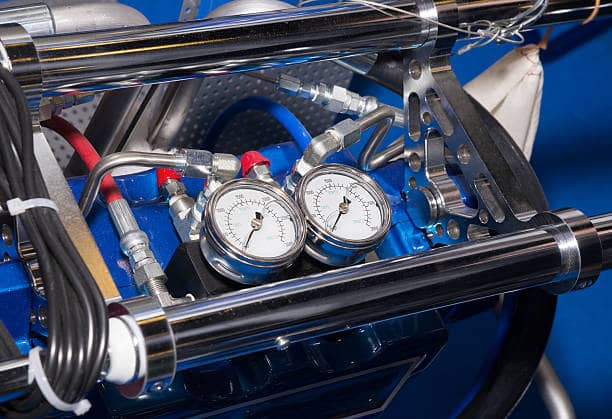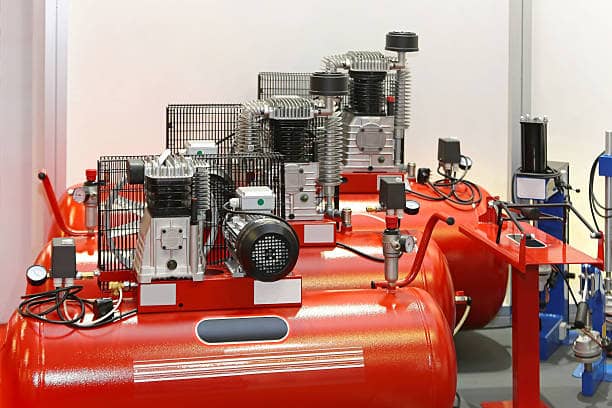As we all know, all cars require a specific grade and type of oil for optimal performance. The same thing happens with compressors.
Using the proper oils for your machine benefits it in various ways. The oils are utilized as lubrication, helping decrease the friction between the components.
That way, it will deliver less heat from the friction, consume less energy and prolong the life of your machine.
With that in mind, you might wonder, “What kind of oil does an air compressor take?” That is also the main topic of this post. Let’s explore!
What Kind Of Oil Does An Air Compressor Take?
If your machine is under warranty, you should use the oil recommended by the manufacturer and typically refer to in the owner’s guidebook.
Your owner’s manual will often recommend the product that will work best for your machine and ensure it reaches peak performance.
The recommendations from the manufacturer should also tell you if synthetic blends work for your compressor.
We recommend always following the warranty guidelines of the manufacturer. Using non-specified substitutes could eliminate added perks and void your machine’s warranty.
If you cannot find the recommended oils in your warranty guidelines, you should use standard compressor oils (from 20 or 30 weights).
30-weight oils are more effective in coating your machine’s parts, but they can become too thick if the temperature drops too low.
Meanwhile, 20-weight oils will work better in cold conditions to ensure your machine starts up and operates when needed.
An oil-less compressor does not require adding oils to its engine as it’s coated before leaving the factory.
In cases, these machines come with a Teflon-kind coating, which will never require adding oil to its motor.
The life span of oil-less machines is less than their oil-lubricated counterparts. Also, they are noisier when running.
Compressor And Motor Oils
As their name suggests, the compressor oil is designed to operate compressors. It is one non-detergent kind.
Typically, motor oils (for cars or trucks) may contain several kinds of detergents, which are handy for internal combustion engines.
However, they are not ideal for compressors as they will actually produce more carbon in a short time.
Air compressor oils are better for those who want to follow the manufacturer’s recommendations to avoid voiding the warranty and the privileges it may have.
You can use non-detergent motor oils for compressors. However, you will need to find something that does not include detergents, which is not easy.
Synthetic And Standard Compressor Oils
Synthetic and standard oils will work well for compressors. But you must consider how often you use your machine to make the final decision.
Standard oils are ideal for homeowners who don’t use their machines often.
In addition, they are considerably cheaper than synthetic products and are an excellent option for light or medium-duty usage.
Synthetic compressor oils are often favored by many professionals or users who utilize their compressors regularly, especially at least four times per week.
According to many users, synthetics also deliver better protection from overheating and have a more comprehensive temperature range for any colder environment.
Plus, they can make compressors run quieter and smoother.
Oil-Less And Oil Lubricated Models: What’s the Difference?
Not all compressors require lubrication. The fact is that oil-less models generally don’t last as long as their Lubricated counterparts.
Changing the oil in your lubricated model as often as it is for your vehicle is unnecessary. Instead, we recommend changing it once each year.
Where Can You Buy Compressor Oil?
Amazon is one of the best places to buy synthetics and standard compressor oils.
It is very convenient to order through Amazon as it offers you products at competitive prices, especially if you are a prime member of Amazon.
And you can expect to receive your goods in a few days.
FAQs
How Often Should You Change Oil on Your Compressor?
Let’s start by checking out your user’s manual, which should include detailed information about compressor oil specifications.
If you can’t find this information, follow these general rules:
- A rotary screw compressor requires lubrication every 7,000 to 8,000 hours of usage while reciprocating should be lubricated every three months.
- Regardless of use, you should change your engine oil at least once each year to ensure efficient operation and a long-lasting life span.
What Are the Benefits of Air Compressor Oil?
Heat absorption: These oils absorb the heat created from your machine, keeping it at a cooler temperature.
Longer life span: These products contain additives that protect your machine components when on standby and make the lubricant compatible with various conditions.
Oxidation resistance: It contains additives that can delay acid formation and oxidation.
Demulsification: Additives in compressor oils can improve water separation and protect your machine from oil and water emulsions.
Viscosity in cold temperatures
But compressor oils can maintain their viscosity even in cold weather. Some oils do not work as efficiently when the temperature drops.
What Are the Benefits of Synthetics?
For Reciprocating Air Models
Safer operation: The flashpoints and auto-ignition temperatures are higher for synthetics.
Less carbon build-up: Synthetics will reduce carbon build-up on the valves and feed rates.
Extended lifetime: Synthetics can help prevent piston rings and packings from premature wear.
For Rotary Screw Air Compressors
Cooler temperatures: Synthetics stay cooler while compressors operate and offer air discharge at a lower temperature.
Fewer deposits: Synthetics help reduce deposits such as sludge and varnish, leading to premature wear and tear and negatively affecting compressors’ performance.
Longer life span: Synthetics can extend the lifespan of rotary screw air compressors by about 8,000 hours.
Less oil consumption: The compressors consume synthetics at a slower rate. That means you will not have to lubricate your machine regularly.
What Are Substitutes for an Air Compressor Oil?
If using an oil design for air compressors is feasible, you might consider the following some acceptable alternatives:
Motor Oils
They might include certain detergents that will benefit internal combustion engines. But these detergents can quickly cause excessive carbon buildup, which is harmful.
As a result, your chosen model should be that your oil should be non-detergent to match your compressor.
Automatic Transmission Fluid
ATF is typically utilized in transmissions of vehicles, but some types can work well for air compressors.
It has several significant benefits for compressors, such as reducing wear and tear, cooling down components, and resisting breakdowns.
Compressors can generate a lot of heat when operating, so this fluid can ensure they work efficiently without any shutdown because of overheating.
But, most Automatic Transmission Fluids don’t work well with the compressor and may even lead to damage.
Hydraulic Oil
It is a reasonable substitute for compressor oils. It features a lower viscosity in a colder temperature, meaning it can flow freely given low density.
As a result, it works well at lower temperatures.
Hydraulic oils do not experience oxidation, which prevents your machine from rusting.
The Bottom Line
What kind of oil does an air compressor take? You should follow tips from the owner’s guidebook when choosing oils for your machine.
If your owner’s manual does not recommend this, you should use standard compressor oils ranging from 20 to 30.
You can use the motor or synthetic oils as substitutes, but you need to ensure your motor oils don’t contain detergents. Hopefully, this post is helpful to you.
Thank you for following this post!





